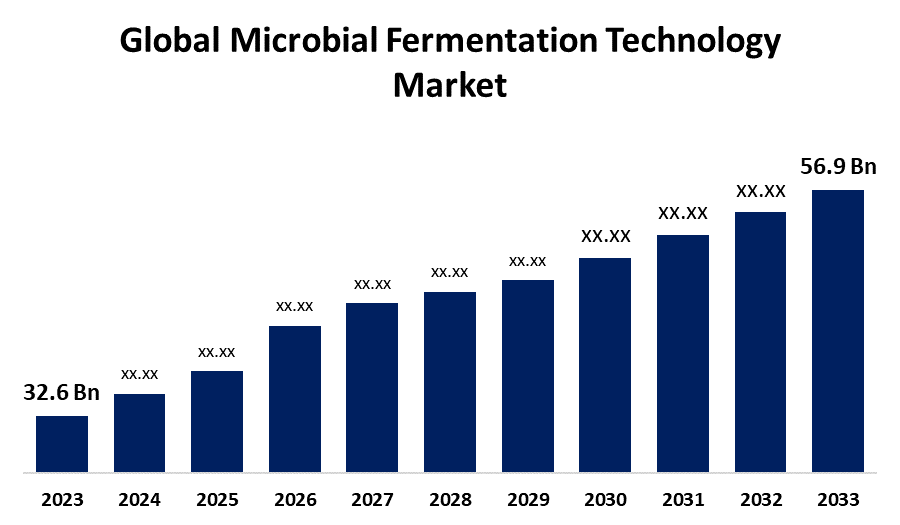Global Microbial Fermentation Technology Market Size, Share, and COVID-19 Impact Analysis, By Application (Antibiotics, Probiotics Supplements, Monoclonal Antibodies, Recombinant Proteins, Biosimilars, Vaccines, Enzymes, Small Molecules, and Others), By End-user (Bio-Pharmaceutical Companies, Contract Research Organizations (CROs), CMOs & CDMOs, and Academic & Research Institutes), and By Region (North America, Europe, Asia-Pacific, Latin America, Middle East, and Africa), Analysis and Forecast 2023 - 2033
Industry: HealthcareGlobal Microbial Fermentation Technology Market Insights Forecasts to 2033
- The Global Microbial Fermentation Technology Market Size Was Valued at USD 32.6 Billion in 2023
- The Market Size is Growing at a CAGR of 5.7% from 2023 to 2033
- The Worldwide Microbial Fermentation Technology Market Size is Expected to Reach USD 56.9 Billion by 2033
- North America is Expected to Grow the fastest during the forecast period.

Get more details on this report -
The Global Microbial Fermentation Technology Market Size is Anticipated to Exceed USD 56.9 Billion by 2033, Growing at a CAGR of 5.7% from 2023 to 2033.
Market Overview
The biological conversion of elements through the use of microorganisms such as bacteria, yeast, or fungi, as the case may be, for the production of usable products is termed microbial fermentation technology. The idea of fermentation is one biology that happens in a controlled environment where bacteria, yeast, or other microbes break down sugar or other compounds and convert them to something valuable such as biofuels, enzymes, pharmaceuticals, and food products. Enzymes, which are chemical catalysts, will be necessary for the production of biofuels. Fermentation is the most used in the food sector where it is a must to promote the production of yogurt, beer, or bread production. As for biotechnology, using the fermentation process is the most sustainable way of making insulin, plastic, or antibiotics. Unfavorably, it is made in endemic areas, naturally, and so all efforts in prevention may be futile. This was mentioned as one of the consequences of the technology's mass production applications because it can deplete valuable resources and the energy required for it may also increase. In addition, it might also be used for developing complex structures that are unfeasible to be synthesized. The process can be custom-tailored by choosing specific microorganisms and making adjustments to environmental parameters like temperature, pH, and oxygen levels. As the demand for manufacturing methods that are economically and environment-friendly increases, microbial fermentation technology plays a vital role in different markets, ranging from bioenergy to healthcare.
Report Coverage
This research report categorizes the market for the global microbial fermentation technology market based on various segments and regions forecasts revenue growth and analyzes trends in each submarket. The report analyses the key growth drivers, opportunities, and challenges influencing the global microbial fermentation technology market. Recent market developments and competitive strategies such as expansion, product launch, and development, partnership, merger, and acquisition have been included to draw the competitive landscape in the market. The report strategically identifies and profiles the key market players and analyses their core competencies in each sub-segment of the global microbial fermentation technology market.
Global Microbial Fermentation Technology Market Report Coverage
| Report Coverage | Details |
|---|---|
| Base Year: | 2023 |
| Market Size in 2023: | USD 32.6 Billion |
| Forecast Period: | 2023 - 2033 |
| Forecast Period CAGR 2023 - 2033 : | 5.7% |
| 2033 Value Projection: | USD 56.9 Billion |
| Historical Data for: | 2019-2022 |
| No. of Pages: | 235 |
| Tables, Charts & Figures: | 110 |
| Segments covered: | By Application, By End-user, By Region |
| Companies covered:: | BIOZEEN, TerraVia Holdings, Inc., Planted, Aurisco Pharmaceutical, Koninklijke DSM NV, F. Hoffmann-La Roche AG, Danone, BioVectra Inc., Biocon Ltd., United Breweries Ltd., Amyris, DSM, Biocatalysts, Bluestem Biosciences, Zero Acre Farms, and Others |
| Pitfalls & Challenges: | COVID-19 Empact, Challenge, Future, Growth, & Analysis |
Get more details on this report -
Driving Factors
Increasing the occurrence of infectious diseases
Microbial infections (bacterial and fungal) are serious problems during respiratory, urinary, surgery, gastrointestinal, and bloodstream infections' mild to severe infections. The widespread nature of infectious diseases has contributed largely to the spread of antimicrobial products such as antibiotics and vaccines to treat infections and this, as a result, has led to global market growth. Microorganisms such as Salmonella and Mycobacterium bovis BCG are used in vaccine production, and once they go through the fermentation process, they are easier to cultivate. The microbial fermentation technology market is projected to rise along with the increased demand for antibiotics and the development of new, high-efficiency drugs.
Restraining Factors
There are high production costs
High costs of equipment, raw materials, and processing, along with limited funding and expertise, hinder fermentation market growth, especially in developing countries.
Market Segmentation
The global microbial fermentation technology market share is classified into application and end user.
- The antibiotics segment is expected to hold the largest share of the global microbial fermentation technology market during the forecast period.
Based on the application, the global microbial fermentation technology market is categorized into antibiotics, probiotics supplements, monoclonal antibodies, recombinant proteins, biosimilars, vaccines, enzymes, small molecules, and others. Among these, the antibiotics segment is expected to hold the largest share of the global microbial fermentation technology market during the forecast period. Microorganisms generated by fermentation in the pharmaceutical industry include medicinal proteins, insulin, enzymes, and antibiotics. Antibiotic production by microbes via secondary metabolism is an important field of applied microbiology. Antibiotics are the most important family of bioactive compounds that may be extracted from bacteria through fermentation. Using cell immobilization to separate cell development from metabolite generation is an effective technique to improve the process, as antibiotic production is associated with non-growth.
- The CMOs & CDMOs segment is expected to grow at the fastest CAGR during the forecast period.
Based on the end user, the global microbial fermentation technology market is categorized into biopharmaceutical companies, contract research organizations (CROs), CMOs & CDMOs, and academic & research institutes. Among these, the CMOs & CDMOs segment is expected to grow at the fastest CAGR during the forecast period. CMOs and CDMOs are rapidly becoming the preferred option for biotherapeutics manufacturers because the majority of bioprocess innovation is achieved by smaller firms with limited capacity, trained professionals, and resources for product commercialization. A constantly growing clinical pipeline of biologics is also expected to contribute to the segment's growth.
Regional Segment Analysis of the Global Microbial Fermentation Technology Market
- North America (U.S., Canada, Mexico)
- Europe (Germany, France, U.K., Italy, Spain, Rest of Europe)
- Asia-Pacific (China, Japan, India, Rest of APAC)
- South America (Brazil and the Rest of South America)
- The Middle East and Africa (UAE, South Africa, Rest of MEA)
Asia Pacific is projected to hold the largest share of the global microbial fermentation technology market over the forecast period.

Get more details on this report -
Asia Pacific is projected to hold the largest share of the global microbial fermentation technology market over the forecast period. This is due to the recognition of Asia Pacific countries as a center for biopharmaceutical outsourcing. Asia Pacific companies, both domestic and international, are expected to build roughly half of the world's new bioprocessing facilities. For example, multiple bioprocessing facilities are expected to be built in China to meet domestic demand. The combination of the aforementioned factors would boost demand for microbial fermentation technology in the region.
North America is expected to grow at the fastest CAGR growth of the global microbial fermentation technology market during the forecast period. This can be attributed to companies' increased involvement in biologics research and product development, as well as the presence of a large number of contract development organizations in the region. A strong regulatory framework is another important factor in shaping the North American market. The US FDA continues to work to improve guidelines for biopharmaceutical product promotion, development, approval, and legal practice. The U.S. is the largest revenue contributor in North America. The evolving landscape of biologics manufacturing is a major driver for the U.S. market. Additionally, increased funding for biopharmaceutical research and development, as well as the use of highly innovative manufacturing technologies for GMP manufacturing, have helped to drive market growth.
Competitive Analysis:
The report offers the appropriate analysis of the key organizations/companies involved within the global microbial fermentation technology market along with a comparative evaluation primarily based on their product offering, business overviews, geographic presence, enterprise strategies, segment market share, and SWOT analysis. The report also provides an elaborative analysis focusing on the current news and developments of the companies, which includes product development, innovations, joint ventures, partnerships, mergers & acquisitions, strategic alliances, and others. This allows for the evaluation of the overall competition within the market.
List of Key Companies
- BIOZEEN
- TerraVia Holdings, Inc.
- Planted
- Aurisco Pharmaceutical
- Koninklijke DSM NV
- F. Hoffmann-La Roche AG
- Danone
- BioVectra Inc.
- Biocon Ltd.
- United Breweries Ltd.
- Amyris
- DSM
- Biocatalysts
- Bluestem Biosciences
- Zero Acre Farms
- Others
Key Market Developments
- In March 2024, Planted, a Swiss plant-based meat startup, invested millions of dollars in fermentation capabilities, creating 30 new jobs at its manufacturing plant in Kemptthal, Switzerland, as it ramps up production of its latest product, a plant-based beef fillet steak.
- In March 2024, Aurisco Pharmaceutical, a leading global pharmaceutical company, announced the completion of its investment in cGMP peptide manufacturing capacity at its USFDA-inspected facility in Yangzhou, China. In addition to its current fermentation and synthetic capabilities, the new advanced manufacturing and purification workshops add multi-metric ton capacity for producing Aurisco's generic GLP-1 peptides.
Key Target Audience
- Market Players
- Investors
- End-users
- Government Authorities
- Consulting And Research Firm
- Venture capitalists
- Value-Added Resellers (VARs)
Market Segment
This study forecasts revenue at global, regional, and country levels from 2020 to 2033. Spherical Insights has segmented the global microbial fermentation technology market based on the below-mentioned segments:
Global Microbial Fermentation Technology Market, By Application
- Antibiotics
- Probiotics Supplements
- Monoclonal Antibodies
- Recombinant Proteins
- Biosimilars
- Vaccines
- Enzymes
- Small Molecules
- Others
Global Microbial Fermentation Technology Market, By End User
- Bio-Pharmaceutical Companies
- Contract Research Organizations (CROs)
- CMOs & CDMOs
- Academic & Research Institutes
Global Microbial Fermentation Technology Market, By Regional
- North America
- US
- Canada
- Mexico
- Europe
- Germany
- UK
- France
- Italy
- Spain
- Russia
- Rest of Europe
- Asia Pacific
- China
- Japan
- India
- South Korea
- Australia
- Rest of Asia Pacific
- South America
- Brazil
- Argentina
- Rest of South America
- Middle East & Africa
- UAE
- Saudi Arabia
- Qatar
- South Africa
- Rest of the Middle East & Africa
Frequently Asked Questions (FAQ)
-
1.What is the CAGR of the global microbial fermentation technology market over the forecast period?The Global Microbial Fermentation Technology Market Size is Expected to Grow from USD 32.6 Billion in 2023 to USD 56.9 Billion by 2033, at a CAGR of 5.7% during the forecast period 2023-2033.
-
2.Which region is expected to hold the highest share in the global microbial fermentation technology market?Asia Pacific is projected to hold the largest share of the global microbial fermentation technology market over the forecast period.
-
3.Who are the top key players in the microbial fermentation technology market?The top key players in the global microbial fermentation technology market are BIOZEEN, TerraVia Holdings, Inc., Novozymes A/S, Lonza, Koninklijke DSM NV, F. Hoffmann-La Roche AG, Danone, BioVectra Inc., Biocon Ltd., United Breweries Ltd., Amyris, DSM, Biocatalysts, Bluestem Biosciences, Zero Acre Farms, and Others.
Need help to buy this report?